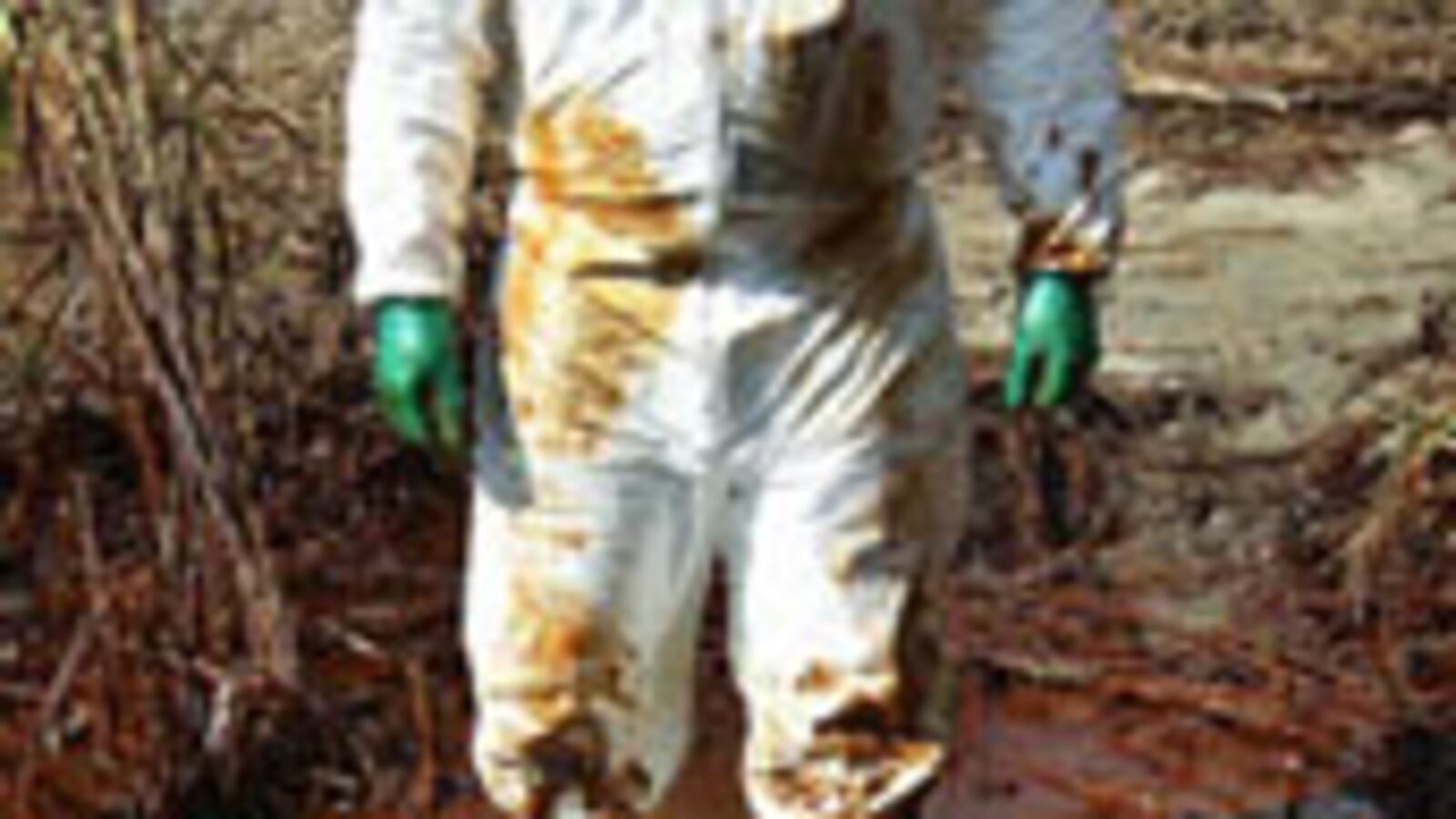
During his Thursday press conference, President Obama made a telling remark about the oil spill that has seized the country's imagination for the better part of a month. "When it comes to prior to this accident happening," said the president, "I think there was a lack of anticipating what the worst-case scenarios would be, and that's a problem." And indeed, one might have said something very similar in the aftermath of Hurricane Katrina. It was widely understood for years, if not decades, that New Orleans was extremely vulnerable to a frontal hit from a truly powerful hurricane, yet the state and federal governments chose to prioritize other things, like the trillion other dangers plaguing the country and the world.
Far from a sign that the president is taking charge of a tough situation, the naming of a czar strongly suggests that he is declaring it a lost cause.
When the next disaster comes, as it surely will, we'll surely hear a similar litany of excuses, many of which will be perfectly valid. But unfortunately for President Obama, gamely acknowledging that we don't always anticipate the worst doesn't mean the outrage will stop.
What might help the public simmer down, rather depressingly, is the appointment of an oil spill czar. Many experts are clamoring for an oil spill czar, despite the fact that Coast Guard Admiral Thad Allen has been named national incident commander. Evidently, this doesn't reflect a sufficiently serious commitment. Taken together with the countless other czars that have been added to the White House since the Reagan era, this will create more direct reports for the president. That is, rather than fit new senior officials into a sane, workable structure, we'll have more random troubleshooters with the pull they need to demand face-time with the president, perhaps the world's rarest, most precious resource. Last year, conservatives had a field day attacking the endless proliferation of czars—for energy, for the auto industry, for closing down Guantanamo, for border security, and much else besides. Steven Menashi, writing in the Weekly Standard, defended the principle behind proliferating czars. He saw czars as an instrument to centralize control of the executive branch in the hands of the president, the better to resist "bureaucratic and congressional usurpation." And there's a logic to this stance.
• Big Fat Story: Biggest Oil Spill DemagoguesBut in reality, the main driver for creating new czars is the political need to demonstrate that the president is taking some very visible action on a hot-button issue. That's hardly ever a recipe for good government. It's hardly surprising that all the president's czars are devoted to the most hopeless tasks, from fighting an unwinnable drug war—Bill Bennett and Barry McCaffrey didn't convince America's youth that cocaine would permanently melt their brains, and no one else will either—to cyber security. Far from a sign that the president is taking charge of a tough situation, the naming of a czar strongly suggests that he is declaring it a lost cause.
Veterans of the Bush White House, like Karl Rove, have noted contrasts between the last president's handling of Katrina and this president's handling of the BP oil spill. In an explosive column in The Wall Street Journal, Rove noted that under the Stafford Act state and local governments must take the lead in handling natural disasters that occur on-shore, while the federal role is to provide all the support and resources that are requested by state and local officials. But in the Gulf of Mexico, far from shore, the federal government has exclusive responsibility. It is easy to see why Kathleen Blanco, Louisiana's governor at the time, has vanished from the political scene, while her hyperkinetic successor Bobby Jindal is keen to take any and every step he can to contain the spill, not least by loudly demanding that the federal government move faster on his controversial plan to construct a series of barrier islands in the Gulf.
Of course, Blanco's failures did not make for a very compelling or, more to the point, a very useful national narrative. Rather, leading political figures, including a very savvy Barack Obama, characterized the arduous struggle to save New Orleans as a failure of Republican governance. This is worth keeping in mind when we consider the following lament from the president: "I realize that this entire response effort will continue to be filtered through the typical prism of politics. But that's not what I care about right now." One wonders if the president can acknowledge that perhaps he filtered the difficult, complex story of Katrina through the typical prism of politics when it served his ambitions.
As for signs of contrition, there were very few. Peter Baker of the New York Times built an analysis piece on the fact that the president uttered the words, "I was wrong," suggesting that it was a sign of deeper regret. But it's by no means obvious that the president believes he's actually done anything wrong. "Where I was wrong was in my belief that the oil companies had their act together when it came to worst case scenarios"—which is to say he was wrong insofar as he underestimated the profound wrongness of BP. There's something more than a little evasive and unsatisfying in the president's rhetorical focus on BP. With the possible exception of Rand Paul, we can all agree that BP hasn't had its act together for a very long time.
Yet would we nod approvingly if President Bush blamed the failure of U.S. efforts to pacify post-invasion Iraq on Saddam Hussein? Had Saddam not brutalized the Iraqi people for decades, after all, the country wouldn't have given rise to so many hardened resistance fighters. That, however, wasn't the issue at hand. What concerned Americans most in the years following the Iraq invasion was the sense that the government, led by President Bush, wasn't living up to its unique obligation to protect the country from harm. The black sludge that threatens to kill the Louisiana marshlands isn't the same kind of threat as nightly suicide attacks on U.S. military personnel, but it is just as vivid.
Reihan Salam is a policy adviser at e21 and a fellow at the New America Foundation.





